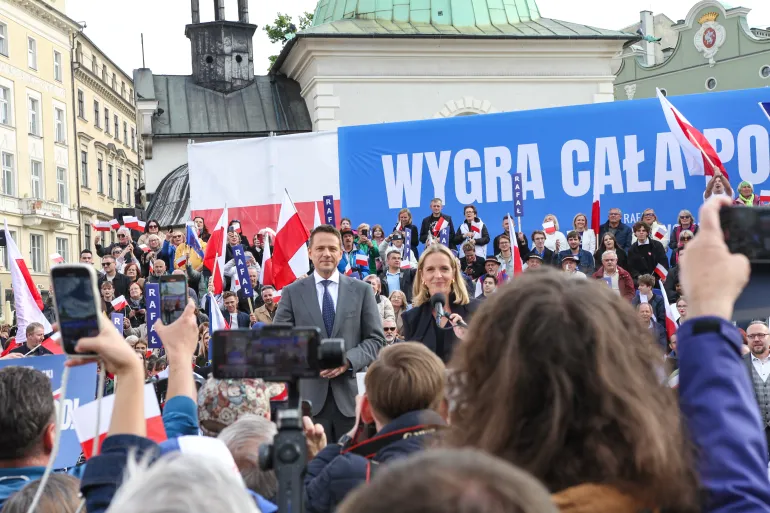Poland is set to elect a new president on Sunday, and the stakes are high. The two top candidates, Rafal Trzaskowski and Karol Nawrocki, are battling over major issues such as migration, EU relations, and the future of Poland’s judiciary. The outcome will determine whether Poland leans toward greater cooperation with the European Union or doubles down on nationalism and closer ties with the United States.
Rafal Trzaskowski, the liberal mayor of Warsaw from the Civic Platform party, is calling for honesty, decency, and a return to European values. At his recent rally in Krakow, he reminded voters of the need for integrity in politics, taking aim at Nawrocki over a scandal involving an elderly man’s apartment. Nawrocki, backed by the opposition Law and Justice party, denies wrongdoing and said he would donate the flat to charity.
In Zabrze, Nawrocki presented a starkly different vision. Sharing the stage with George Simion, a Romanian ultranationalist and winner of the first round of Romania’s presidential vote, Nawrocki criticised the EU’s efforts to centralise power. He promised to resist any attempts to turn Poland into what he called an EU “province”, pushing instead for stronger alliances with the United States. His campaign even claims to have received backing from Donald Trump during a recent visit to the White House.
What are the key issues shaping Poland’s 2025 presidential election?
Migration, EU relations, and judicial reforms are central to the campaigns of both candidates.
Migration remains a divisive issue. Nawrocki is embracing free-market rhetoric while opposing benefits for migrants, particularly Ukrainians. Surprisingly, Trzaskowski has also taken a tougher stance, endorsing the government’s move to suspend asylum rights and vowing to cut benefits for unemployed Ukrainians. Both appear to be appealing to the growing populist sentiment stirred up by Slawomir Mentzen of the far-right Confederation party, who wants even harsher migration controls.
Public opinion shows that economic concerns drive anti-migrant views in Poland. According to political scientist Bartosz Rydlinski, many Poles wrongly believe Ukrainians receive public benefits without contributing to the economy, even though most of them work and pay taxes.
Among the supporters, emotions run deep. One attendee at Trzaskowski’s rally in Krakow, Anna Szol, said she wants to raise her daughter in a “normal country” that’s positive and respected worldwide. She supported the asylum suspension at the Belarusian border, blaming it on manipulation by Putin and Lukashenko.
But experts warn that mainstream politicians adopting far-right positions could backfire. Rydlinski said that when liberal and left-wing parties try to copy populist messaging, they often lose their core supporters instead of gaining new ones.
At the heart of this election is also a power struggle between the government and the presidency. Outgoing President Andrzej Duda, a staunch ally of Law and Justice, frequently used his veto to block reforms by the Civic Platform-led government. These include attempts to reverse judicial changes that were ruled illegal by the European Court of Justice.
According to political expert Ben Stanley, a Nawrocki victory could keep the current political gridlock in place, obstructing the government’s legislative plans and weakening democratic checks and balances. On the other hand, if Trzaskowski wins, the government will likely be able to push ahead with overdue reforms and align more closely with EU standards.
As Poland prepares to vote, the country stands at a crossroads. Whether it moves toward deeper EU integration or turns inward with nationalist policies will depend on who takes office—and on how far they’re willing to compromise their ideals to secure power.

